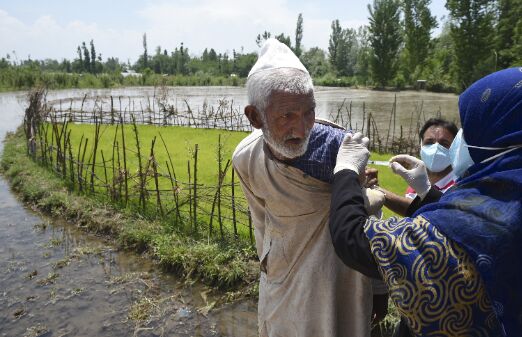An exemplary act
Successful vaccine drive in Binagunda can be replicated across the country by overcoming hesitancy through personalised communication

Maruthi, the young son of Binagunda's 'patil' (village head), has been working as a kotwal with the Bhamragad administration for the past few years. A few days back, he trekked over 20km to inform the Bhamragad Tehsildar that the health team couldn't find any success in vaccinating Madia tribals of Binagunda and other nearby villages. All villagers had refused to take vaccination from a health team that reached out to these areas recently. The fear of Covid rampaging his village in the next wave was clear in his hushed but concerned tone. The monsoon would also play a spoilsport, as these villages would be cut off from the rest of the civilisation for four months or so. The administration would lose any opportunity to vaccinate them at that time. The kotwal himself had got the jab, but he had not been able to convince many of his village folks.
On the evening of Buddha Purnima, May 26, the tehsildar told me about the problem at hand. We decided to chart a plan to vaccinate every eligible person of Binagunda and other nearby villages. Our plan was underway for the rest of the Bhamragad taluka's interior areas, but these presented a completely different challenge altogether.
First, the villages were so far, deep in the Naxal territory, that reaching there and vaccinating was a herculean task. Most tribals will not make the effort to travel 20-30 km to the nearest health centre to get vaccinated. Second, rumours, superstitions, misinformation were rampant among most of these people. The source is unknown, but the apprehensions like 'davai se napunsak ho jaynege' (We will be rendered impotent from vaccines), surprised us. More so, the majority simply refused to take the vaccine without any reasonable explanation. The team felt this could also be due to a lack of confidence in the health and general administration among the tribals.
After much deliberation, we decided to chart a vaccination plan on the lines of an election exercise. We planned to organise four vaccination camps — one in Kuwakodi (the easternmost Gram Panchayat of Maharashtra), Permilbhatti, Fodewada and Binagunda each. All of the villages are located in the infamous Abujmarh region, often referred to as the 'liberated-zone' by Naxalites. These villages are home to the Madia tribe that is recognised as Particularly Vulnerable Tribal Groups by the Government of India. Due to the primitive nature of their lifestyle (by no means inferior), these tribes continue to live in seclusion from the rest of the world. Our fear lies in the cold hard fact that if the recent strains of COVID-19 make its way to these villages, lack of health facilities and immediate care could potentially lead to much misery and loss of human life. One way to address this problem would be to vaccinate as many persons of this area as possible, on a war footing level.
The whole plan had various components: First, an intense awareness campaign would take place in each village on May 28. The administration team along with all the Patwari, Kotwals, and persons with influence in the area would travel to each village and organise meetings in the Ghotuls — the traditional meeting halls of the Madias. Travelling itself was dicey as our vehicle crossed at least five flowing rivulets, removed heavy stones along the forest trail and was stuck multiple times on a hilly and inaccessible terrain. All the villagers were informed in advance about the meeting. The first meeting was held at Fodewada, a hamlet of around 30 houses. The 'ice-breaking session was done by talking about general issues faced by the villagers. It was key to establishing some rapport with the villagers. This was followed by transitioning to the topic of health and Covid. A video of local leaders and influencers like Prakash Amte ji, who has a very recognizable face in Bhamragad was shown to all. It instantly struck a chord with many of them as all the influencers spoke in their language, explaining Covid and how vaccination could protect them. Afterwards, we took the questions of each villager with much patience.
In the classic dialectic method, which is still practised in this area, both sides presented arguments. One of the village seniors wanted us to visit the nearby water source first and address the water problem as well. The meetings went much beyond the Covid as they enabled us to note many problems faced in these inaccessible areas. Eventually, all the villages were convinced to get vaccinated by the end of the long but fruitful day.
The next morning, 'vaccination booths' were set up in each village. The vaccination booth agent was armed with the list of all villagers above 45 years of age. These were extracted from the electoral rolls already available with the administration. The first to get vaccinated was the local 'patil', Maruthi's father. He led by setting an example for all to follow. Many villagers were encouraged to come out of their houses and get vaccinated. A little hesitation was still visible on some old, sun-spotted faces. 59 out of 68 persons, almost 87 per cent of the entire eligible population, were vaccinated. Those beyond 18 years of age are eagerly waiting for their chance as well. As the day ended, we knew that with the right awareness campaign, some personal touch from vaccination warriors, and a clear system and process of vaccination, we could defeat vaccine hesitancy and vaccinate one village at a time in the entire area.
I would like to give all the credit for this Operation Vaccinate Binagunda to Tehsildar Anmol Kambde and the team, Sattu, Kotwal-Phodewada, Dinkar Kotwal-Turremarka, Chukku Kotwal-Kuvakodi, Maruti Kotwal-Binagunda, Shankar Kotwal-Laheri, and Akash Kotwal-Malampodur.
Views expressed are personal



